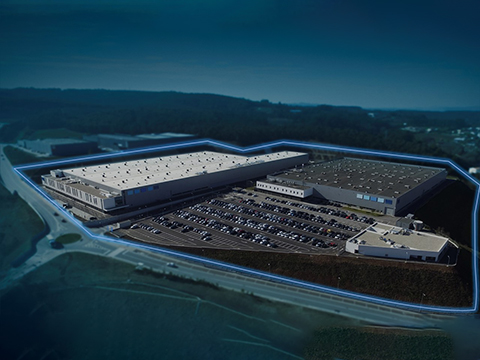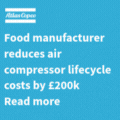
Posted to News on 17th Feb 2025, 10:45
WEG launches new motor technologies at factory opening ceremony
WEG has celebrated an important milestone with the opening of its new Santo Tirso Industrial Park in Portugal. This state-of-the-art facility is a key element of WEG's ongoing strategy to expand its presence across Europe, North Africa and the Middle East, all while focusing on sustainable technologies.

(See WEG at FoodManufacturing.Live, 15 October 2025, on stand 56)
The new Industrial Park marks a crucial step in WEG's broader growth plan. Founded in 1961 in Jaragua do Sul, Brazil, WEG has evolved from an electric motor manufacturer into a global leader in industrial automation, energy and power transmission.
Portugal has been part of WEG's expansion since 2002 when the company acquired Efacec Universal Motors. The country's strategic location offers a gateway to key markets across Europe, North Africa, and the Middle East.
"When we first started in Portugal, we had 154 employees," says Joao Cardante, sales and marketing director for WEG Portugal. "Now, we're more than 750 strong, which reflects WEG's commitment not only to the European market but also to sustainability and innovation."
Manufacturing excellence in Portugal
Located in Santo Tirso, near Porto, and spanning over 100,000 square meters, the new Industrial Park is one of WEG's largest manufacturing sites outside Brazil. It features two major manufacturing hubs: one for low-voltage (LV) and the other for high-voltage (HV) solutions.
The LV centre has been a core part of WEG's operations in Portugal for many years, producing motors in the 225 to 335 frame size range. It also includes a dedicated paint booth, dry blasting cabinet and warehouses for motor production components, helping to streamline processes and reduce lead times.
The newly constructed HV centre focuses on medium- and high-voltage motors, which include advanced motor control systems. Currently, the facility can manufacture motors up to a 1,400-frame size, with the potential to exceed this as demand grows.
In addition to its manufacturing capabilities, the park includes state-of-the-art research and development (R&D) and testing facilities. The testing lab is one of the most comprehensive of its kind in Europe, allowing WEG to conduct full-load testing of its motors, drives and other industrial technologies.
"This isn't just a factory; it's a strategic hub designed to improve efficiency and sustainability for industries throughout Europe," says Marek Lukaszczyk, WEG's marketing manager for Europe and the Middle East.
Launching the W51Xdb motor
The inauguration of the Industrial Park on October 17 featured the launch of one of WEG's most advanced products to date: the W51Xdb high-efficiency flameproof motor. This motor is designed to support the global shift towards hydrogen as a clean energy source. Hydrogen plays a crucial role in decarbonising industries, but it's safe use presents specific challenges.
The W51Xdb addresses these issues by offering high power density while maintaining safety in hazardous environments. "The motor has been engineered to provide optimal performance even in confined spaces, and its flameproof design prevents ignition in case of gas leaks," explained Cardante.
Certified for use in explosive atmospheres across all key global markets, the W51Xdb enhances safety in environments where hydrogen is produced or stored. This innovative motor is expected to play a critical role in projects requiring high efficiency and stringent safety measures. The demand has already been strong, with 90 units sold in advance of the first deliveries, which are scheduled for January 2025.
New motor technologies from WEG
In addition to the W51Xdb, WEG unveiled another innovation: the W80 AXgen electric motor. Designed with an axial flux structure, the W80 AXgen is engineered for original equipment manufacturers (OEMs) seeking compact, energy-efficient solutions.
This technology offers higher torque, a reduced system footprint and impressive efficiency of up to 96 per cent. Its space-saving design and advanced cooling system make it ideal for a variety of industrial applications, while its robust performance ensures reliability in demanding environments.
This latest development follows the introduction of the W23 Sync+ ULTRA motor in 2023 - the world's first motor to meet the anticipated IE6 efficiency standard. Lukaszczyk added "Our latest motor technologies push performance limits while helping industries lower their carbon footprint."
Sustainability at the core
Sustainability is central to WEG's approach, not only in its products but also in its operations. The Santo Tirso Industrial Park is powered entirely by renewable energy, which aligns with the company's long-term goal of carbon neutrality.
During the inauguration, Daniel Marteleto Godinho, WEG's director of sustainability, emphasised this commitment: "Our Portuguese facility operates 100 per cent on renewable energy, reinforcing WEG's global dedication to driving sustainability. Initiatives like this have enabled WEG to reduce its global carbon emissions by 25 per cent in just two years."
Additionally, WEG's investment in the Industrial Park is expected to create more than 100 new jobs, boosting the local economy and solidifying the company's presence in the region. During the event, Alberto Costa, the mayor of Santo Tirso, highlighted WEG's commitment to the local community.
The facility's official opening was marked by speeches from key WEG figures, including Antnio Duarte, director general of WEG Portugal, and Alberto Yoshikazu Kuba, CEO of WEG globally. In his emotional speech, Kuba emphasised WEG's core values: "At WEG, it's not just about technology or products - it's about people."
WEG's new Industrial Park in Portugal represents a major milestone in the company's long-term vision. The majority of the high-performance motors produced at this facility will be exported to five continents, serving industries worldwide.
The new site stands as a testament to WEG's commitment to growth, sustainability and in industrial technologies innovation. As the company continues to expand its reach from Europe to North Africa and the Middle East, it is also shaping the future of industrial manufacturing, helping to drive the global transition to a greener, more efficient world.




